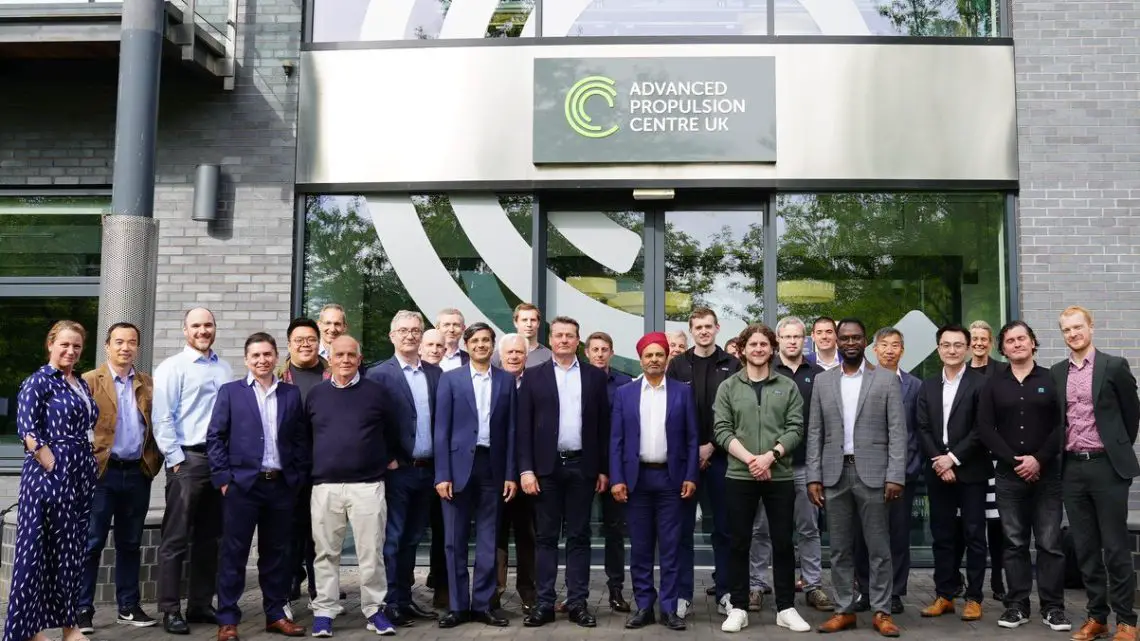
Hydrogen companies get share of £1.8m to help revolutionize the electric vehicle market
May 17, 2022Two innovative hydrogen technology…
SMEs have been awarded a share of £1.8m from the Advanced Propulsion Centre (APC) to help the global race to decarbonize transport.
Catalsys from Hartlepool in County Durham and Viritech from Nuneaton in Warwickshire will both receive £135,000 support through APC’s Technology Developer Acceleration Programme (TDAP), to drive the market-readiness of their next-generation technology, as the UK’s ban on the sale of new petrol and diesel engines grows closer.
Catalsys is a novel technology that can produce hydrogen from ammonia. It uses a proprietary reactor design and heat integration to perform this conversion at high efficiency within a compact footprint. Ammonia can be produced and transported cheaply with very low-cost renewable energy and then once on site, Catalsys technology will enable the ammonia to be cost-effectively ‘cracked’ back to hydrogen. This will form an essential part of the future supply chain for low-cost, low-carbon hydrogen for transport applications.
Kevin Fothergill, Chief Executive of Catalsys Ltd, said: “This grant and the support provided by the Advanced Propulsion Centre will make a huge contribution to our ability to develop and commercialize our innovative technology.”
Viritech’s Tri-Volt transforms the efficiency of a fuel cell powertrain. Current systems use a fuel cell to charge a battery and the battery drives the wheels. In contrast, Tri-Volt creates a dynamic energy system: the fuel cell and the battery are used either selectively or in combination to maximise efficiency and improve weight and range.
Timothy Lyons, CEO of Viritech, said: “This grant from the Advanced Propulsion Centre will enable Viritech to achieve production-readiness of our revolutionary technology by 2024. As the hub of UK automotive technology, it will also open many doors to us.”
TDAP isn’t just about grant funding, the programme also supports hydrogen companies to build a robust business plan, protect their intellectual property and understand the investor landscape. Previous TDAP alumni say this, together with the networking and collaboration opportunity, is where the real value of the programme lies.
And the results are there to see. APC analysis shows that in total, since completing the programme, TDAP alumni have raised over £127m of private investment, 61% of that coming in 2021 – demonstrating the significant growth in green investment over the past 18 months.
Examples include Romsey-based Ilika, from last year’s TDAP scheme, who are now partnering with Comau (a subsidiary of car-giant Stellantis who also own names like Alfa Romeo, Chrysler, Citroën, Fiat, Jeep, Peugeot and Vauxhall) to industrialize their solid-state battery production.

Josh Denne, APC’s Head of SME programmes, said: “Some of the technology being developed by these companies is so ‘next-generation’ it almost feels like something out of a sci-fi movie. However, these are credible, tangible technology concepts, some of which are already attracting the attention of household names in the automotive industry.
“Applications for this cohort of our SME accelerator programme have been the highest we have ever received, reflecting the opportunity within the automotive sector and the appetite for this type of support.
“We have a huge challenge to overcome to make the movement of people and goods sustainable, and it’s no surprise that we’ve seen a larger than usual spread of technology focused on HGVs, perhaps reflecting that this difficult to decarbonize transport is fast becoming in urgent need of solutions to lower emissions.
“Our ambition for TDAP is to see these great ideas grow into next-generation products, ultimately leading to more to CO2 savings, more jobs created and contributing to the push towards net zero as the UK cements itself as a leader in innovative propulsion technology.”
This year’s full TDAP cohort are:
About:Energy – trueTemp
Thame, Oxfordshire
TrueTemp is a patented method to accurately measure the thermal conductivity of batteries. This allows for precise internal temperature prediction, improving battery efficiency and safety.
Gavin White, CEO of About:Energy, said: “The training and funding made available by the APC will enable About:Energy to unlock our high-impact battery thermal parameterisation, for which we are extremely grateful.”
ANGOKA Ltd – HUMS
Belfast, County Antrim
ANGOKA is a UK-based cyber security start-up which already has BT and Innovate UK on its list of collaborators and customers. Their Health and Usage Monitoring System (HUMS) will enable the continuous monitoring of major components in EVs – primarily the motor and battery pack – sending data from the components direct to the manufacturer. This continuous monitoring will enhance reliability and provide a complete record of the component’s use history at the end-of-life of the vehicle.
Yuri Andersson, CEO of ANGOKA, said: “This grant from the Advanced Propulsion Centre will enable ANGOKA to develop HUMS to the point where it can be fitted to production vehicles. We also believe that the TDAP ecosystem will provide unrivaled networking opportunities.”
Botanic Energy – Zero Emissions Freezer and Thermal Transport System
Horsham, West Sussex
Most existing on-vehicle refrigeration systems, for transporting items like food and pharmaceuticals, are powered by diesel. Botanic Energy is developing a low-energy transport refrigeration system utilizing thermodynamics, rather than fossil fuels. Incorporating thermoelectric assemblies, the system takes advantage of temperature differences between internal and external environments, providing an energy efficient, solid-state heat transfer system using natural refrigerants.
Nick Wyllie, Founder and CEO of Botanic Energy, said: “We are delighted that the Advanced Propulsion Centre has made this grant award available to support the development of this innovative transport refrigeration technology by Botanic Energy.”
Catalsys
Hartlepool, County Durham
Catalsys is a novel technology that can produce hydrogen from ammonia. It uses a proprietary reactor design and heat integration to perform this conversion at high efficiency within a compact footprint. Ammonia can be produced and transported cheaply with very low-cost renewable energy and then once on site, Catalsys technology will enable the ammonia to be cost-effectively ‘cracked’ back to hydrogen. This will form an essential part of the future supply chain for low-cost, low-carbon hydrogen for transport applications.
Kevin Fothergill, Chief Executive of Catalsys Ltd, said: “This grant and the support provided by the Advanced Propulsion Centre will make a huge contribution to our ability to develop and commercialize our innovative technology.”
CurvEx Technology – Flextrude
Birmingham, West Midlands
Weight is incredibly important for low-carbon transport. A lighter vehicle, can travel further on low-carbon energy, or carry more load. CurvEx Technology have developed an innovative manufacturing process, integrating the ‘extrusion and bending’ operation to extrude curved lightweight parts without the common defects of traditional bending processes, saving time and cost.
Professor Jianguo Lin, FREng, a co-founder of CurvEx Technology Ltd, said: “We are very excited to start a new journey in the Technology Developer Accelerator Programme to upscale a promising scientific idea for industrial applications. The valuable support from the Advanced Propulsion Centre will surely enhance our market position and increase our technology and manufacturing readiness levels for further commercialisation.”
Fergusson’s Advanced Composite Technology (FACT) Ltd – N2GEM
London
Thermoset adhesives are used as potting compounds to hold the wire windings in electric motors together. These adhesives are high in stiffness and strength but are intrinsically brittle. By replacing conventional adhesives with nanocomposite systems FACT Ltd will increase the toughness of these windings along with their peak operating temperature, meaning motors can operate at a higher power level.
Alex Fergusson, founder of FACT Ltd, said: “We’re delighted to be accepted to the TDAP programme. We are excited to work with the APC’s team on expanding the use of our nanocomposite systems beyond aerospace and further into the automotive sector as the world transitions towards an electrified and sustainable future.”
Gaussion – ‘MagLiB’
London
Gaussion’s innovative technology intends to bring an end to charge anxiety by achieving 20 miles-per-minute of EV battery charge – significantly higher than the market average of six miles-per-minute. They’ve developed bespoke magnetic field systems that aid Li-ion battery charging by reducing resistances. Their products are external, meaning that neither the battery nor the vehicle need to be altered.
Dr Tom Heenan, Gaussion CEO, said: “The TDAP programme and supporting grant offer significant value across many aspects that will be critical to the success of Gaussion. We are thrilled to be accepted into the cohort and are excited to begin working with the Advanced Propulsion Centre and its delivery partners.”
iCOMAT – Rapid Tow Shearing (RTS)
Bristol
Rapid Tow Shearing allows for the creation of more complex-shaped, bio-based composite components for vehicles by designing with curved fibres. Fibre steering through RTS enables lighter weight components with improved structural integrity, while at the same time minimising the use of raw material and thus reducing production costs and environmental footprint.
Evangelos Zympeloudis, CEO of iCOMAT, said: ‘’We are honoured that the Advanced Propulsion Centre has provided iCOMAT the opportunity to further develop its novel Rapid Tow Shearing technology through the TDAP programme.”
SysElek – Modular Megawatt Charging for eHGVs
Warwick
SysElek’s technology is a high-power EV charger, designed for charging electric Heavy Goods Vehicles (eHGVs) quickly, with modular integration to different power distribution network connections and local energy storage as a power buffer. The batteries of eHGVs are expected to standardise around 500kWh in line with operators’ range demands and the cost of batteries. By recharging a 500kWh battery back from a 1MW charger, a full recharge can be achieved in around 30 minutes. This means recharging will be possible during a driver’s break in journeys or during vehicle loading/unloading activity at depots.
A spokesperson for SysElek, said: “We are delighted that the Advanced Propulsion Centre has recognized the innovative work being undertaken by SysElek and provided this grant support.”
Syselek.com
Tetra Design Services Ltd – EMLoFF
Dudley, West Midlands
EMLoff (Electric Module for Low Flat Floor) Drive is an innovative solution for low floor, easy access electric vans and trucks that will increase carrying capacity and could remove the need for power lifts. It challenges conventional thinking by repackaging the powertrain and suspension into the vehicle wheel arch, delivering up to 25% increase in capacity when compared to trucks currently on the market.
Tom Hughes, Tetra Programme Manager, said: “Thanks to the Advanced Propulsion Centre, we are now in a position to demonstrate and test our innovative low floor electric drive axle and suspension solution for commercial vehicles, which offers up to 25% more capacity.”
Transense Technologies Plc – Surface Acoustic Wave (SAW)
Bicester, Oxfordshire
Transense’s sensor technology is able to measure torque, temperature, pressure and strain on the motors used to power electric vehicles, delivering improvements in performance, efficiency and safety.
Ryan Maughan, Director of Transense, said: “The TDAP project will allow Transense to accelerate development of its sensor technology in the automotive sector which is an exciting and rapidly growing market. We believe that technology can deliver substantial improvements in efficiency performance and safety integrity to electric drive systems. This project will allow us to develop technology in this area and help secure commercialization opportunities.”
The Tyre Collective – Tyre wear capture
London
Today, over a million tonnes of tyre wear particles are produced annually across Europe. It is the second-largest micro-plastic pollutant in our oceans and a major contributor to air pollution. This is an increased concern in electric vehicles due to added battery weight and torque. The Tyre Collective is developing the first on-vehicle device to deal with tyre wear at the source using electrostatics and airflow to capture particles which can then be upcycled.
Hanson Cheng, Co-founder & CEO of The Tyre Collective, said: “We are honoured to be a part of TDAP. The mentorship and funding provided by the Advanced Propulsion Centre will help us accelerate development and build our network, taking us one step closer to true net-zero mobility.”
Viritech Ltd – TriVolt
Nuneaton, Warwickshire
Tri-Volt™ transforms the efficiency of a fuel cell (FC) powertrain. Current systems use a fuel cell to charge a battery and the battery drives the wheels. In contrast, Tri-Volt™ creates a dynamic energy system: the fuel cell and the battery are used either selectively or in combination to maximize efficiency and improve weight and range.
Timothy Lyons, CEO of Viritech, said: “This grant from the Advanced Propulsion Centre will enable Viritech to achieve production-readiness of our revolutionary technology by 2024. As the hub of UK automotive technology, it will also open many doors to us.”
About the Advanced Propulsion Centre
The Advanced Propulsion Centre (APC) collaborates with UK government, the automotive industry and academia to accelerate the industrialization of technologies, supporting the transition to deliver net-zero emission vehicles.
Since its foundation in 2013, APC has funded 170 low-carbon projects involving 402 partners, working with companies of all sizes, and has helped to create or safeguard nearly 50,000 jobs in the UK. The technologies developed in these projects are projected to save over 288 million tonnes of CO2, the equivalent of removing the lifetime emissions from 12 million cars.
With its deep sector expertise and cutting-edge knowledge of new propulsion technologies, APC’s role in building and advising project consortia helps projects start more quickly and deliver increased value. In the longer term, its work to drive innovation and encourage collaboration is building the foundations for a successful and sustainable UK automotive industry.
In 2019 the UK government committed the Automotive Transformation Fund (ATF) to accelerate the development of a net-zero vehicle supply chain, enabling UK-based manufacturers to serve global markets. ATF investments are awarded through the APC to support strategically important UK capital and R&D investments that will enable companies involved in batteries, motors and drives, power electronics, fuel cells, recycling, and associated supply chains to anchor their future.
For more information go to apcuk.co.uk or follow us @theapcuk on Twitter and Advanced Propulsion Centre UK on LinkedIn.



 With over 15 years of reporting hydrogen news, we are your premier source for the latest updates and insights in hydrogen and renewable energy.
With over 15 years of reporting hydrogen news, we are your premier source for the latest updates and insights in hydrogen and renewable energy.